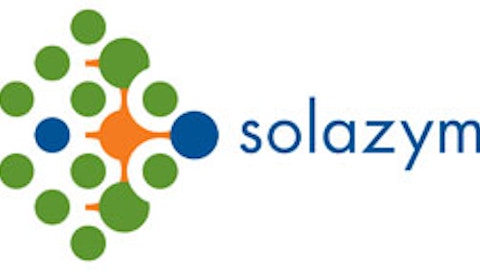The high gas prices of summer 2008 may be a distant memory to you by now, but the Department of Defense has not been so quick to forget. A combination of dependence on internationally sourced energy and exposure to volatility in the markets has nudged Uncle Sam to pursue renewable energy at a furious pace in recent years. That is probably a good idea: More than 93% of fuel consumed by the federal government can be chalked up to the DoD, according to a strategic review (link opens PDF) published by the U.S. Navy in 2010.
Dozens of companies with the capacity to produce next-generation renewable fuel — fuels may or may not be the primary focus of each — have answered the call. The latest comes from industrial biotech company Gevo, Inc. (NASDAQ:GEVO), which has begun supplying the U.S. Coast Guard with initial quantities of renewable isobutanol-blended gasoline for maritime vessels. This comes after an earlier collaboration with the U.S. Air Force in 2011, an extension of which calls for an additional 45,000 gallons of isobutanol-derived jet fuel to be supplied by the end of October. What do these partnerships with Uncle Sam mean for the future of the company?
What you need to know
Gevo, Inc. (NASDAQ:GEVO) is supplying finished 16.1% renewable isobutanol-blended gasoline under a 12-month operational study with the U.S. Coast Guard R&D Center, Honda Motor Co Ltd (ADR) (NYSE:HMC), and Mercury. The same Gevo, Inc. (NASDAQ:GEVO) fuel was used in Honda Motor Co Ltd (ADR) (NYSE:HMC) engines for eight hours a day for three months earlier this year. The engines were dismantled after testing to inspect wear and tear associated with isobutanol. Mike Coleman, U.S. Coast Guard project manager for the study, said he was pleased with the initial tests and that he expects a decision on the suitability of isobutanol-fuel blends for the Coast Guard’s gasoline-fueled crafts to be made following the completion of the current 12-month study.

The Coast Guard will be testing Gevo, Inc. (NASDAQ:GEVO)’s fuel in this 38-foot special purpose craft and a smaller 25-foot response boat. Source: U.S. Coast Guard
Can it succeed? No fuel is perfect, but isobutanol is a rather suitable blendstock that has several major advantages over ethanol.
| Ethanol | Isobutanol | |
|---|---|---|
| Blend Reid Vapor Pressure (RVP) | 18-22 psi | 4.5-5.5 psi |
| Blend octane | 112 | 102 |
| Energy content (% gasoline) | 65% | 82% |
| Water solubility | Fully miscible | Limited miscibility (8.5%) |
| Oxygen content | 35% | 22% |
Source: Gevo White Paper, May 2011
Without getting too technical, a fuel’s RVP determines the blending costs refiners must pay. The higher the value, the costlier the blending process. The lower the value, the more costs that can be eliminated. Additionally, higher energy content and limited water solubility (leads to corrosion of pipelines, engines) of isobutanol compared to ethanol makes it a superior blendstock.
Don’t forget about…
Gevo, Inc. (NASDAQ:GEVO) may be a promising renewable fuel partner for Uncle Sam, but it isn’t the only one. Solazyme Inc (NASDAQ:SZYM) began extensive testing on three of its fuels — two renewable diesels and one renewable jet fuel — with the U.S. Navy in 2009. The company supplied 600,000 gallons of fuels between 2011 and 2012 under various programs. Similarly, Amyris Inc (NASDAQ:AMRS) is working with DARPA under The Living Foundries program to build a quickly scalable industrial biotechnology platform. While it could one day be used for fuels or chemicals, vaccines or nutritionals, such a breakthrough would certainly catch the eye of the petroleum-guzzling DoD. Outside of the project, the company is working toward supplying commercial quantities of renewable jet fuel with partner Total by 2014 and already supplies renewable diesel in Brazil.
Both Solazyme Inc (NASDAQ:SZYM) and Amyris Inc (NASDAQ:AMRS) — as well as other next-generation fuel manufacturers — offer drop-in renewable fuels at blends greater than Gevo, Inc. (NASDAQ:GEVO)’s 16.1% renewable isobutanol-blended gasoline. The important thing to remember is that there is no silver bullet for replacing petroleum — multiple renewable fuels will flourish in their respective niche. Should the Coast Guard approve Gevo’s fuel for use in gasoline-powered vessels, investors sure as heck wouldn’t complain. The market, even for smaller gasoline-powered crafts, is huge.
Foolish bottom line
Is this a big deal for Gevo? Let’s preface the answer to that question by saying that the company’s commercial success hinges on production metrics from its first isobutanol biorefinery in Luverne, Minn., where operations were restarted this summer, and which is expected to produce 18 million gallon per year. Announcements regarding the retrofit of the Redfield Energy facility (capacity of 50 million gallons per year) should also be on your investing radar in the next several quarters. Nonetheless, industrial biotech companies will be looking to throw their limited initial capacity behind the highest-margin products. Fuels are not necessarily the best option out of the gate.
That being said, the armed forces represent a massive opportunity for the industry. This could very well be the collaboration that puts isobutanol-blended gasoline on the map, but it is still a developing story. Until Gevo receives Uncle Sam’s approval, investors will want to keep an eye on capacity additions and revenue ramping. At a market valuation of less than $100 million — below realistic revenue totals for 2015 — I can see patient investors reaping significant long-term gains.
The article Department of Defense Needs These Companies to Succeed originally appeared on Fool.com is written by Maxx Chatsko.
Fool contributor Maxx Chatsko has no position in any stocks mentioned. Check out his personal portfolio, his CAPS page, or follow him on Twitter @BlacknGoldFool to keep up with his writing on energy, bioprocessing, and biotechnology.The Motley Fool owns shares of Solazyme.
Copyright © 1995 – 2013 The Motley Fool, LLC. All rights reserved. The Motley Fool has a disclosure policy.



